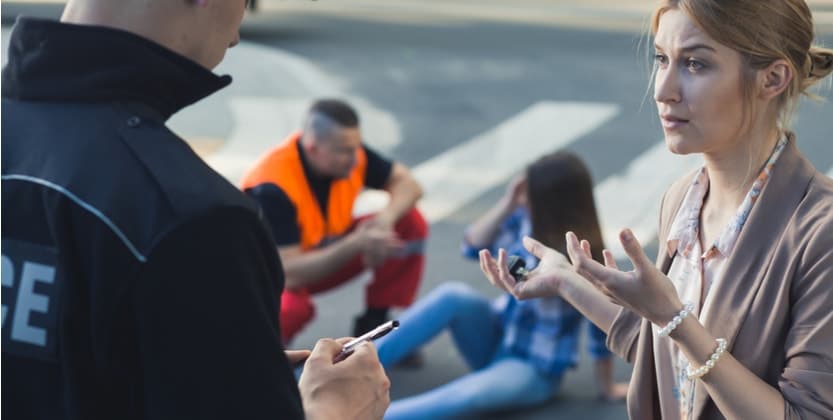Witnessing a car accident first-hand can be an incredibly horrifying experience. The sights, sounds, and smells of a crash can cause even the bravest individuals to continue driving as if they didn't see a thing.
While witnesses of car accidents are not at all obligated by law to remain at the scene of a car accident, oftentimes our concern for fellow motorists makes us want to stop and do whatever we can to help. If you've witnessed a car accident and decided to remain at the scene, these tips should help you remain level-headed.

1. Keep Yourself Safe First
If you spot a car accident and decide to pull over to help, it is paramount that you ensure your own safety first. Remember, you won't be of any help if you ultimately injure yourself. When you pull over, be sure to indicate with your traffic signal that you'll be switching lanes, and park at the side of the road at least 100 feet from the scene.
When pulling over, you want to give yourself enough distance so that you won't put yourself in danger of any leaking fuel, fumes, broken glass, or flames. Before you leave your vehicle, put on your hazard lights to alert other motorists.
2. Contact Emergency Services
It's easy to assume that another individual has already called 911. Even if you think the authorities have already been called, dial 911 anyway. Regardless of whether the accident appears to be severe or not, emergency services should be notified. Provide the 911 operator with your location, the number of individuals involved in the accident, and any other pertinent details.
3. Check on Victims
Check on the condition of accident victims to ensure they're alright, and offer to help if you can. Unless there is a risk of the automobile catching fire, under no circumstances should you move a severely injured person. Though you mean well, you could accidentally exacerbate the injuries. Instead, wait with the victim and keep them alert until medical professionals arrive at the scene.
Likewise, remember to put your personal judgement to the side. While you may feel as though one individual was definitely at fault for the accident, now is not the time to voice those concerns. Instead, offer any basic help that you can and wait for the police to give your statement.
4. If Possible, Stabilize the Vehicles
One of the most prominent dangers following an accident is a fire or explosion due to leaking fluids. If the accident is minor, ask the drivers to put their automobile in park and turn off the ignition. This is will help to mitigate the risk of fire, especially since the crash may have caused a coolant, fuel, or oil leak.
If damage to the vehicle is minor and it's possible for it to be moved, direct the driver to either pull to the side of the road or to remove the vehicle from harm's way. This will leave more space for emergency vehicles to enter the scene as well as lessen the chance that other motorists on the road will strike the vehicle or the accident victims.
5. Speak with Police
When police arrive on the scene, provide them with your full name and contact information as well as what you've seen and any relevant facts of the accident. Be sure to be completely honest in your portrayal of the event. Be as factual as possible, and remain consistent in your statements. In the weeks following the crash, you may be contacted as a witness by the insurance or legal representatives for the accident's victims.
Things to Remember After Witnessing an Accident
Car crashes can be incredibly traumatic, even as a witness and not as a victim. However, it is paramount that you remain is calm as possible. Remember that by enlisting yourself to aid the victims, they're depending on you to be a comforting or otherwise helpful figure in a very stressful situations. Approaching their vehicle in a panicked, angry, or upset manner can further aggravate the emotions they're already feeling.
Other important dos and don'ts to bear in mind after witnessing an accident include:
- DO: Continue driving safely until you can securely find an area to pull over and park.
- DO: Only exit your vehicle if it is safe to do so.
- DO: When speaking with 911, provide short, clear answers. The sooner you can efficiently communicate what happened, the sooner authorities can reach the scene.
- DON'T: You are not legally obligated to stop if you witness an accident. However, if you were at all involved in the accident you must stop by law. Do not flee the scene; this would classify the accident as a hit-and-run.
- DON'T: Unless you are an experienced medical physician, do not attempt to provide medical care. This could make the injury worse, which could make you liable for a civil liability case.
- DON'T: When emergency services arrive, give them the right information and then let them do their jobs. Do not hover over them.
Should I Stop if I Witness a Car Accident?
The bottom line is, you are of no legal or moral obligation to stop if you've witnessed a car accident. However, if you believe you can safely and effectively help the situation, bear in mind these tips before rushing onto the scene. For in-depth answers to questions about auto accidents, please check out our car accident lawyer faqs.
Contacting a trusted auto accident attorney can help you understand if you need to take any further steps after witnessing an auto accident. Contact an auto accident attorney near me today for a free consultation to answer any questions you might have.


